Nov 2020 1st Edition
Nov 2020 1st Edition vuyelwan
Translations
'Lockdown' declared SA Word of 2020
'Lockdown' declared SA Word of 2020 Ursula‘Lockdown’ is the South African Word of the year. 
'Lockdown' alongside 'COVID-19' and 'Jerusalema' were shortlisted by the Pan South African Language Board (PanSALB), in association with media research company, Focal Points, as candidates for SA Word of the Year 2020.
Lockdown was declared the winner.
The South African Word of the Year is a word, term or expression preferred to reflect the passing year in language.
PanSALB reviewed candidates for SA Word of the Year and their merits were debated choosing one that captures the philosophy, mood, or preoccupations of this particular year.
“We can all attest to the rampage caused by the Coronavirus. It is all that we have talked about as we continue to navigate through its unforgiving rage. Hence, in choosing this year’s SA Word of the Year we have had to take the process a step further to broaden the criteria and also consider the cultural significance and influence the word has had amongst South Africans,” says PanSALB Acting Chief Executive, Willie Manana, in a statement.
“The lockdown has affected various parts of our lives and continues to do so: how we conduct business, our social interactions and cultural practices,” he added.
Through Focal Points, keywords were tracked for the period October 2019 to September 2020.
This media data was analysed to determine the prominence of the keywords within the media and to identify the frequency that they were used in credible print, broadcast and online media.
Furthermore, the usage of the words on platforms such as social media, everyday interactions and their cultural significance were considered for inclusion in the shortlist.
With the declaration of the National State of Disaster on 15 March 2020, PanSALB says the word ‘lockdown’ suddenly became a topical issue and part of everyday vocabulary as the country went on Level 5 lockdown on 27 March 2020.
“Scores of people queued outside bottle stores and supermarkets stocking up on groceries in preparation of what was to become one of the strictest lockdowns in the world,” read the statement.
In true Mzansi style, South Africans soon found creative ways to entertain themselves amidst the pandemic to adjust to the ‘new normal’.
Many well-known DJs and music channels took to hosting virtual ‘lockdown parties’, friends and family connected virtually via digital platforms such as Zoom.
“There is no argument that the lockdown has changed the way we live and has opened up a whole new world that has made it possible for us to work in the comfort of our own homes. Reaching just under half a million mentions on print, broadcast, online and further mentions on social media and in everyday conversations - all accumulated in just over six months, we dare say the word/term ‘lockdown’ is a worthy winner,” said PanSALB. -SAnews.gov.za
4IR to come with low data costs
4IR to come with low data costs SiboneloThe Fourth Industrial Revolution (4IR) could come with lower data costs for South Africans. 
According to the Minister of Communications and Digital Technologies, Stella Ndabeni-Abrahams, one of the key factors that come with 4IR is the engagement with mobile operators to reduce the high cost of data.
She says actual opportunities in 4IR include coming up with innovative ways to give citizens the ability to positively impact their lives.
In order to empower citizens of the country, the Minister says her department will bridge the digital divide between the digitally empowered on the one side and the digitally deprived on the other.
The 4IR can be described as the rise of the technological age, and will provide developing and emerging economies like South Africa, an opportunity to advance the application of science and innovation.
Minister Ndabeni-Abrahams says the role of her department is to lead South Africa’s response to the 4IR and developing policies and legislations that create an enabling environment. On the readiness to lead the 4IR in the country, the Minister says 4IR utilises converging technologies to design an all-inclusive human-centric future.
Her remarks follow the appointment of the Presidential Commission on the 4IR by President Cyril Ramaphosa.
The 34-member commission was established to develop South Africa’s blueprint on the 4IR. It has eight workstreams which are led as follows:
- Science, Technology and Innovation- Mr Thulani Dlamini
- Infrastructure and resources – Dr Andile Ngcaba
- Human Capital and Future World of Work – Ms Beth Arendse
- Capital Markets and Financing – Prof Chris Adendorf
- Commercialisation and Industralisation – Ms Lindiwe Mkhonza
- Policy and Legal – Ms Charmaine Houvet
- Socio-economic impact – Mr Rob Shutter
- Integration, Programme Management and Communication – Ms S’onqoba Vuba
Artisans build gogo a home
Artisans build gogo a home UrsulaNomciciyelo Makabane, 62, now has a new home-thanks to a group of young artisans who were trained by the Department of Higher Education and Training’s (DHET) National Skills Fund. 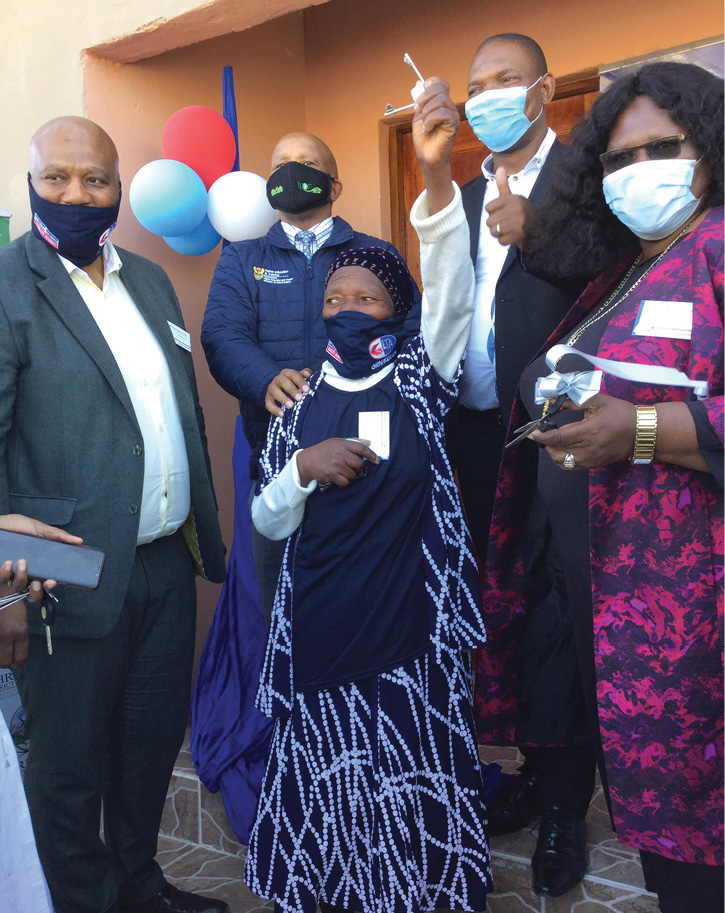
Based in Khwebulana village in Cofimvaba, Eastern Cape, Makabane now lives in a five-room house that has three bedrooms, a kitchen and a storage room.
“The house is big enough to accommodate me and my family," said Makabane
In the past, Makabane was living with relatives and family friends. There was also a time when she lived in a mud house which was later destroyed by rain.
Makabane and her family are delighted to have a roof over their head which has also brought them dignity.
The construction of Makabane's house forms part of a programme funded by the DHET, in partnership with construction company Grinaker-LTA. The programme sought to train young people who had an interest in becoming artisans. The youth were trained in carpentry, brick-laying, plastering and tiling, concrete mixing and form work.
Carpentry trainee Hlumela Gxoko, 29, says the skills she learned from the programme have enabled her to take up odd jobs that require a carpenter. Gxoko is one of the young people who helped build Makabane’s home.
Gxoko also added that she was happy to have received the training because she can now install built-in cupboards, doors, roofs and ceilings.
“As much as I knew about construction, this training equipped me with skills that I previously did not have. I am now using these skills in my community to generate an income,” she says.
Gxoko says she will use her carpentry skills to help in projects similar to Makabane’s home. “Having seen the joy it brought to Makabane, I will in future use my skills to help in projects like this that are helping the poor.”
Gxoko is one of the 240 young people who graduated from the programme in the Intsika Yethu Local Municipality.
The construction of the house was part of showing the skills that the trainees had gained from the programme.
Avoid becoming a human trafficking victim
Avoid becoming a human trafficking victim UrsulaAs the number of human trafficking cases being reported increases, it is important that you take steps to ensure your safety. 
To avoid becoming a victim of trafficking, you should avoid travelling alone at night or on deserted streets.
It is important that you are aware of your surroundings at all times. Being alert will help spot something that is out of place. If you notice a person or a car following you, find a crowded place and contact the police or someone you trust immediately.
Traffickers often use the promise of a job to kidnap their victims and will approach potential victims offering them a job or some kind of opportunity. This form of trafficking can happen anywhere – even on social media, at school, in the mall and outside your house.
Make sure you conduct thorough research on potential employers before going to meet them in person for interviews. This can be done by verifying that the company really exists by checking with the Companies and Intellectual Property Commission.
You should also tell someone you trust when you are going to an interview and arrange for them to call you after a certain amount of time. If possible, have someone go with you.
Be careful when using social media, especially when a stranger offers to help, offers money, a place to stay or a job opportunity in response to something you posted.
If you are going out to meet someone new, do so at a public place and let someone you trust know where you are.
When going out with children, keep them close and make sure you can see them at all times.
You should never send a child on an errand without a trusted adult to watch over them. Get into the habit of checking in on your children regularly, so you know where they are.
This information was supplied by the Department of Justice and Constitutional Development
For more information on human trafficking, contact the National Human Trafficking Hotline on: 0800 222 777. To report human trafficking contact the police on 10111.
Building a society that works
Building a society that works vuyelwan
The launch of the Presidential Employment Stimulus last week marks a fundamental shift in our approach to tackling unemployment.
We are undertaking a far-reaching and ambitious public investment in human capital, with the state as both a creator and an enabler of jobs. The Presidential Employment Stimulus is unprecedented in its scale and breadth, involving a public investment of R100 billion over the next three years.
We will protect and create directly-funded jobs and livelihood support interventions while the labour market recovers from the coronavirus pandemic. Each of these is ready for implementation, and is additional to existing commitments.
While some of the interventions build on the strengths of existing programmes, the stimulus also includes new and innovative approaches. 
This includes a focus on what we have termed ‘social employment’. We are working from the premise that there is no shortage of work to be done to address the many social problems in our society. The aim is to support the considerable creativity, initiative and institutional capabilities that exist in the wider society to engage people in work that serves the common good. This work cuts across a range of themes, including food security, ending gender-based violence, informal settlement upgrading and much more.
This will supplement the efforts of the public sector, allowing for greater scale and social impact as well as new forms of partnership with diverse social actors.
The stimulus includes a new national programme to employ teaching and school assistants in schools. Schools are making these appointments right now, delivering new opportunities in every community across the length and breadth of the country.
Public employment is not just for unskilled work. There is a cross-cutting focus on graduates, with opportunities for nurses, science graduates, artisans and others.
The stimulus will also protect jobs in vulnerable sectors that have been hit hard by the pandemic. Support will be provided to Early Childhood Development practitioners, mainly self-employed women. Over 74,000 small farmers will also receive production input grants.
As a nation, we need arts and culture to lift our spirits once more – the stimulus provides new funding to help the sector back onto its feet, including support to digital content-creation and expansion of e-commerce platforms.
This will enable artists to adapt to the new market conditions that the pandemic has imposed on us all and to seize new opportunities for growth.
A critical enabler for wider job creation, made more important by the pandemic, is connectivity. To overcome the digital divide, the stimulus will provide affordable, high-speed broadband to low-income households through innovative connection subsidies and the expansion of free public WiFi.
As our country recovers from the devastation of the Coronavirus pandemic, we are in no doubt as to the size of the task before us.
We have to achieve an economic recovery that is swift and inclusive. We have to get as many of our people as possible working again. We also have to regain lost ground in the provision of basic services and critical infrastructure, addressing social challenges and transforming townships and rural communities too. Public employment is an instrument that can do all of the above: creating jobs at scale in the short term while markets recover, and creating social value in the process.
The example is often cited of the massive public works programme undertaken by the United States after the Great Depression in the 1930s. This was not just a stimulus, but also promoted social participation and inclusion.
There are several examples of innovative public employment programmes in the developing world, including in India, Ethiopia and here in South Africa. These programmes make a direct investment in local economies, reaching poorer areas first, supporting local small enterprises and trickling up into the wider economy from there.
They also promote social participation and inclusion, providing communities with the means to change their lives as they undertake new forms of work. In doing so, they contribute to transformation both at a local level and within broader society.
Direct public investment to support employment and create economic opportunities that generate social value does more than just tackle the unemployment crisis.
It is responsive, because it uses the state’s resources to respond to local community needs, be it for greener spaces, food security, more early childhood development centres, or for better and more accessible roads.
It is progressive, because it offers social protection and income security to those who face destitution because they are unable to find work.
It is an investment in the future, in that it supports the broader economic recovery agenda by urgently getting our people to work on improving our national and municipal infrastructure.
Through the interventions in the stimulus, we are creating work for those who need it, while leaving a lasting impact on entire communities.
Like public employment programmes across the world, this employment stimulus supports and complements the critical role of the private sector in creating jobs. It is counter-cyclical, in that as the recovery advances, the scale of public employment will decline.
The work experience and skills acquired by beneficiaries of the Presidential Employment Stimulus will improve their prospects of securing formal employment.
The experience gained is also a pathway to entrepreneurial activity. Participants will improve their skills and capabilities to start their own businesses, and can use the steady income provided by public employment to branch out into other income-generating activities.
I have consistently affirmed that the COVID-19 crisis is also a window of opportunity to build back better.
At this time of great upheaval, we would be doing ourselves no favours by making unrealistic promises that raise expectations, only to come short when they are not met. This is why each of the jobs and livelihood support interventions is fully funded, with a clear implementation plan.
The employment stimulus is not about vague commitments for some time in the future, but about jobs being created right here and now.
The stimulus is the result of extensive consultation with national departments, provinces and metros to rapidly design employment programmes that can be rolled out or expanded within six months.
The implementing departments and other stakeholders were rigorously assessed on their capacity to implement.
In every one of the programmes that fall under the stimulus, opportunities will be widely advertised and recruitment will be fair, open and transparent.
The goals we have set ourselves are realistic, measurable and achievable, and draw lessons from past experience and international best practice.
Our people are ready and willing to work. This vast potential must be harnessed, and our collective skills and capabilities brought to bear in rebuilding our country in the wake of the coronavirus.
The Presidential Employment Stimulus provides a respite for families who have endured a long hard winter with greatly reduced income, and for individuals who have spent many years without work.
Real, decent work is the right of every human being. It is a precondition for economic growth and social stability.
By giving effect to this fundamental right, the Presidential Employment Stimulus is making a decisive contribution to building a society that works.
COVID-19 TERS fraud hotline launched
COVID-19 TERS fraud hotline launched SiboneloIf you are aware of fraud, especially related to the distribution of monies to help workers through the worst effects of lockdown, now is your chance to blow the whistle and help bring fraudsters to book. 
This was an invitation sent by Acting Commissioner of the Unemployment Insurance Fund (UIF), Marsha Bronkhorst, during the launch of fraud hotline platforms for clients and citizens to report all suspicious criminal activity related to the COVID-19 Temporary Employer-Employee Relief Scheme (COVID-19 TERS) and any other UIF fraud- related matters.
Launched recently, the platforms are already up and running, and people can report anonymously, in line with the Protected Disclosure Act.
Bronkhorst said that since the inception of COVID-19 TERS, the fund has received large amounts of fraud allegations and complaints from clients and companies.
“I am therefore, urging anyone with information regarding any COVID-19 TERS fraud or any other UIF fraud-related matter to report this to us without any delay. Whistle-blowers are encouraged to provide as much details as possible, such as the UIF reference number of the company, address, ID numbers concerned and contact details when reporting," said Bronkhorst.
She added that each case will be treated on its own merits and the turnaround time to finalise the allegation would vary depending on the complexity of the matter. SAnews.gov.za
The reporting platforms are available 24 hours per day, 365 days a year and in all 11 official languages. Clients can use the following platforms to report COVID-19 TERS related fraud: Toll free number 0800 212 799 or SMS call-back to 30916 or email uif@thehotline.co.za. For other UIF enquiries, clients can still contact the call centre on 080 003 0007 or visit their nearest labour centre
Culture does not justify abuse
Culture does not justify abuse UrsulaSouth Africans need to use their diverse culture to promote the protection of women and children against gender-based violence (GBV). 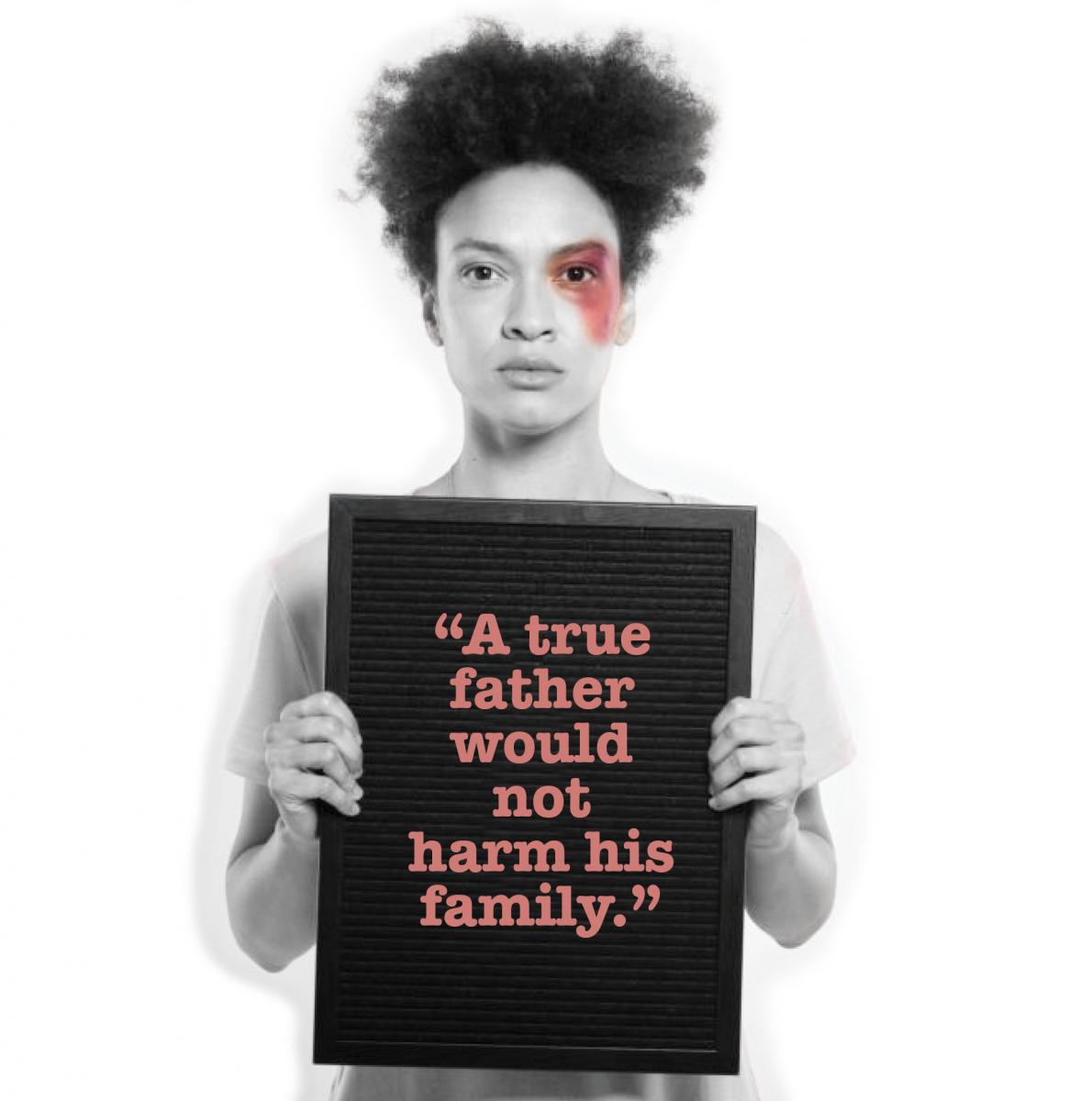
This was according to Basic Education Deputy Minister Reginah Mhaule during a webinar aimed at exploring the role of culture in child protection and prevention of GBV.
The webinar reflected on the aspects of culture that make it difficult for South Africa to succeed in its efforts to protect children from sexual violation and abuse.
According to police reports, incidents of GBV have increased during the Coronavirus (COVID-19) national lockdown.
The Deputy Minister says South Africa has a high prevalence of sexual abuse and harassment perpetrated against learners. This does not only compromise the learning and teaching environment but carries long-term negative mental and sexual health consequences for the victim.
“Recent academic research shows that about 35.4 percent of girls and boys experience sexual violence before the age of 17,” says Deputy Minister Mhaule.
Reporting sexual abuse in schools
In order to address this problem, the department has developed and deployed a protocol for the management and reporting of sexual abuse and harassment in schools.
The protocol provides a guide to the management and reporting of sexual abuse, ensuring an appropriate and timely response to cases of sexual abuse and harassment.
“Over the years, we have developed and distributed a handbook to learners on how to prevent sexual abuse in public schools, titled, ‘Speak Out - Youth Report Sexual Abuse.’ The purpose of the handbook is to equip learners with knowledge and understanding of sexual harassment and sexual violence,” the Deputy Minister says.
The handbook also provides contact details of national and provincial organisations that can assist. “GBV is a man-made problem. We must reach out to the boy child before reaching puberty so that we instil in him the better notion of masculinities that are underpinned by respect for women,” she says.
She adds that all citizens have to report cases of GBV.
The Deputy Minister says GBV tends to affect women excessively as it is deeply entrenched in the workplace, societal institutions such as churches, different cultures, and traditions in the country.
“As a society, we need a new value system that puts women’s health, comfort and lives at the centre of our humanity,” she says.
The Deputy Minister says cultural practice that enables men to assume that they are entitled to the bodies of women also need to be dealt with as part of the broader nation-building effort.
“As a country, we must take firm and decisive action to rid our country of racism, sexism, classism, homophobia, and bigotry of any kind that opposes the values of our Constitution,” she says.
African culture and Ubuntu
According to Social Worker Mpho Ramoloto, African cultures are built on values of Ubuntu, which is loving, courteous, sympathetic, caring and warm in nature.
“Our culture is beautiful and should never be used in ways that promote and benefit immoral acts of any individuals. Africans have always had indigenous systems that allow families to function in a way that is beneficial to their members. For example, uncles would play father-figure roles in the lives of children who are fatherless, and a true father would not harm his family,” he explains.
Ramoloto says gender-roles and principles of culture are sometimes misinterpreted and misused to suppress children and women’s rights. These need to be addressed in order to root out elements of abuse of women and children.
He says culture can be used to instill values that can transform society to be more loving, caring and respectful, and free of abuse.
“We need to reinforce the culture of respecting children and women amongst men in our society in order to deal with the challenge of GBV and children abuse. Men need to unlearn having the sense of entitlement, dominance and rulership over women and children. This is where many social ills come from,” he says.
Did you know?
If you are being abused, or suspect that someone is being abused you can call:
- South African Police Service 10111
- Childline 0800 055555
- GBV Command Centre 0800 428 428 or send Please call me to *120*7867#
- Stop Women Abuse Hotline 0800 150 150
Exercise has benefits for the elderly
Exercise has benefits for the elderly SiboneloIt is important for older persons to e xercise in order to keep physically fit and to keep chronic diseases at bay.
xercise in order to keep physically fit and to keep chronic diseases at bay.
This is what Mbuyiselo Sijako, 66, of Thabong in Welkom in the Free State says, after participating in the Active Ageing Programme that was recently organised by the Department of Social Development.
The programme was part of the department’s basket of services and interventions to address a variety of challenges faced by older persons in Matjhabeng Local Municipality. The programme was in collaboration with the South African Social Security Agency (SASSA) and National Development Agency.
The Active Ageing Programme is an initiative of the department, in partnership with the South African Older Persons Forum (SAOPF). It aims to uphold the human rights of older persons and to respond to their developmental needs.
Its goal is to improve the quality of life of older persons, promote independence and participation in various social, cultural and sporting initiatives that seek to prevent and reduce old-age related diseases.
As a participant of the programme, Sijako says he sometimes walks about 10 kilometres to his nearest town just to keep fit, because he is no longer consistent with exercising as he was before.
“Growing up, I was a rugby player and an athlete, but due to aging, I had to stop. I can no longer run. I walk a lot and that keeps me active and it minimises my chances of getting sick,” says Sijako, who stays with his wife and two grandchildren.
He encourages other older persons to always make time to do simple in-house exercises in order to improve their health and well-being.
“Older people do not have much to do and they are always sending children everywhere to do things for them. This makes their muscles weak, so I really encourage them to exercise and stretch their muscles,” he says.
Funding for youth with disabilities
Funding for youth with disabilities UrsulaYoung entrepreneurs who live with disabilities and would like to apply for funding from the National Youth Development Agency (NYDA) must complete the same application form as every other applicant. 
According to the NYDA, if the applicant lives with a disability, all they need to do is to indicate their disability on the application.
The NYDA has a grant programme that is designed to provide young entrepreneurs with the opportunity to access both financial and non-financial business development support in order to enable them to establish or grow their businesses. The NYDA was established to address the challenges faced by the nation’s youth.
How much grant can I receive from the NYDA?
The grant finance starts from R1 000 to a maximum of R200 000 for any individual or youth co-operative, but for agriculture and technology-related projects, the maximum amount is R250 000.
Young people whose business ideas qualify for the grant programme, depending on their individual needs, will also receive some of the NYDA’s non-financial support services that include:
- mentorship
- business consultancy services
- market linkages
- business management training programme
- youth co-operative development programme
Partial funding, co-funding or funding towards a deposit for a loan from another lending establishment
What do I need to apply??
In order to meet the criteria, applicants must be between 18 and 35 years old. They must also have skills, experience or potential skills, appropriate for the enterprise that they conduct or intend to conduct.
Most importantly, applicants must be South African citizens who live in the country and operate a business within the borders of country.
Applicants must also be involved in the day-to-day operation and management of the business with at least one or more of the members being a fulltime employee of the business, especially the main applicant.
This information was supplied by the National Youth Development Agency (NYDA)
You can contact the NYDA by calling 087 158 6345/5738 or email info@nyda.gov.za
Healing childhood trauma
Healing childhood trauma UrsulaA non-governmental organisation is working hard to help young children deal with past hurts and trauma in the Western Cape 
The Community Keepers non-governmental organisation (NGO) is addressing child abuse by providing 28 schools in the Western Cape with trauma counselling services.
The NGO has counsellors and social workers permanently located at schools in Cape Town and the Cape Winelands. The team of professionals assist pupils who have been victims of violence at home or in their local communities.
The NGO’s Chief Executive Officer Gerrit Taning says they treat pupils with different traumatic experiences through group and individual sessions.
“We work in disadvantaged communities where violence is prevalent. We help children who have experienced adverse childhood experiences such as abuse, loss, poverty and other challenges that are faced by children,” says Taning.
One of the key topics the NGO seeks to address during sessions with the pupils is the belief that 'men don't cry'. The organisation aims to teach young boys to be in tune with their feelings and emotions. This will encourage young boys to talk about their feelings and experiences.
Taning says that trauma can cause behavioural problems in children.
“When there is a cycle of traumatic experiences that builds up, it often affects children negatively. A quiet child will start lashing out and engaging in risky behaviour. A child that was outgoing suddenly becomes withdrawn. Some pupils go from the brightest students to not being able to keep up with their peers.”
He says that trauma can be dealt with, but it requires proactive teaching of children before the cycle is repeated.
Schools looking to partner with Community Keepers can call 072 781 5535 or email info@communitykeepers.org.
Incubator helps grow small-scale farmers
Incubator helps grow small-scale farmers SiboneloA partnership between small-scale farmers and farmer incubator Ukhanyo Farmer Development, has helped Mveleli Mhlonitshwa, 38, turn his 30- hectare small-holder farming project into a commercial farm. 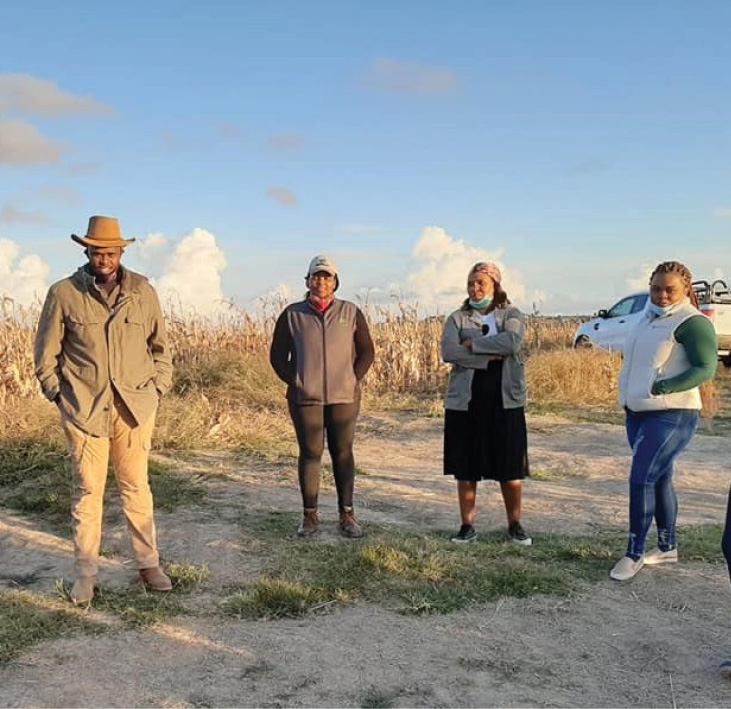
Mhlonitshwa sells maize to feedlots, animal feed producing companies and his local community.
Mhlonitshwa’s farm is situated in the Upper Tabase village in Mthatha, Eastern Cape. He says that Ukhanyo Farmer Development has helped improve the productivity of his farming activities by supporting him with production inputs as well as mentorship.
The incubator supported Mhlonitshwa with seeds, fertilizers and machinery to grow his farm.
Mhlonitshwa who started as a small-scale farmer in 2011, is now harvesting about 8.6 tons per hectare of maize. “When I started farming, I was harvesting about four tons per hectare,” he says.
The Ukhanyo Famer Development incubator is a 36-member strong business that helps subsistence and small-scale farmers grow into commercial farmers. The incubator is made up of 32 women; more than 30 young people and operates in the Alfred Nzo, OR Tambo, Joe Gqabi, Chris Hani and Amathole district municipalities of the Eastern Cape.
 Chairperson of Ukhanyo Farmer Development, Sinelizwi Fakade, says mentorship is done by members of the incubator who all hold a higher education qualification that is agriculture related. The mentors work with the farmers on a daily basis. They share technical knowledge on farming and guide the farmers on how to produce the best harvest.
Chairperson of Ukhanyo Farmer Development, Sinelizwi Fakade, says mentorship is done by members of the incubator who all hold a higher education qualification that is agriculture related. The mentors work with the farmers on a daily basis. They share technical knowledge on farming and guide the farmers on how to produce the best harvest.
The incubator has managed to turn ordinary small-scale farmers into successful commercial farmers.
“Out of the 170 farmers we worked within the previous farming season, we managed to grow 15 farmers from subsistence and small-scale farming to commercial farming. In the previous season the farmers planted on 300 hectares of land and on average harvested 4.8 tons of maize per hectare,” Fakade says.
Ukhanyo Farmer Development is currently working with 600 farmers.
Fakade adds that their incubator is also working in partnership with the Eastern Cape’s Department of Rural Development and Agrarian Reform (DRDAR) as well as private sector partners, to provide the farmers with support.
For more information about Ukhanyo Farmer Development call 071 519 4192 or 081 062 6922.
Language app helps doctors and patients communicate
Language app helps doctors and patients communicate UrsulaThe Council for Scientific and Industrial Research (CSIR) and Aweza have collaborated to develop a unique mobile application to bridge communication barriers between healthcare providers and patients. 
Aweza is an international award-winning tech-based initiative that strives to inspire and empower South Africans to overcome language barriers across all sectors of society. The mobile application, AwezaMed COVID-19, features localised speech technology such as speech recognition, machine translation, and text-to-speech developed by the CSIR and works on any Android smartphone.
It enables healthcare providers to access a phrase in English, translate it into any South African official language, and play the phrase in the selected language. Originally developed with content pertaining to maternal healthcare and obstetrics, the application has been enhanced with COVID-19-related content and is available for download from the Play Store. There is no cost for users.
“By bridging the communication barrier, the trust relationship between the healthcare provider and patient can be improved. In addition, the patient’s experience and the healthcare provider-patient confidentiality can be improved, and lives can possibly be saved,” says Dr Karen Calteaux, CSIR Digital Audio-Visual Technologies Research Group Leader.
The content of the application was developed in collaboration with health experts and is aimed at supporting healthcare workers to communicate with patients at healthcare facilities, especially during COVID-19-related screening.
“AwezaMed emanated from a project funded by the Department of Sport, Arts and Culture, that strives to bridge language barriers between healthcare practitioners and patients in clinics. A decision was taken to develop a version to address language barriers experienced by medical professionals working with COVID-19 patients,” Dr Calteaux says.
The CSIR is an entity under the Department of Science and Innovation. -SAnews.gov.za
Lucky leads flourishing gaming business
Lucky leads flourishing gaming business UrsulaBeing aware of his physical limits and understanding his disability has motivated Lucky Shabalala (26) to become an entrepreneur who also creates jobs for locals. 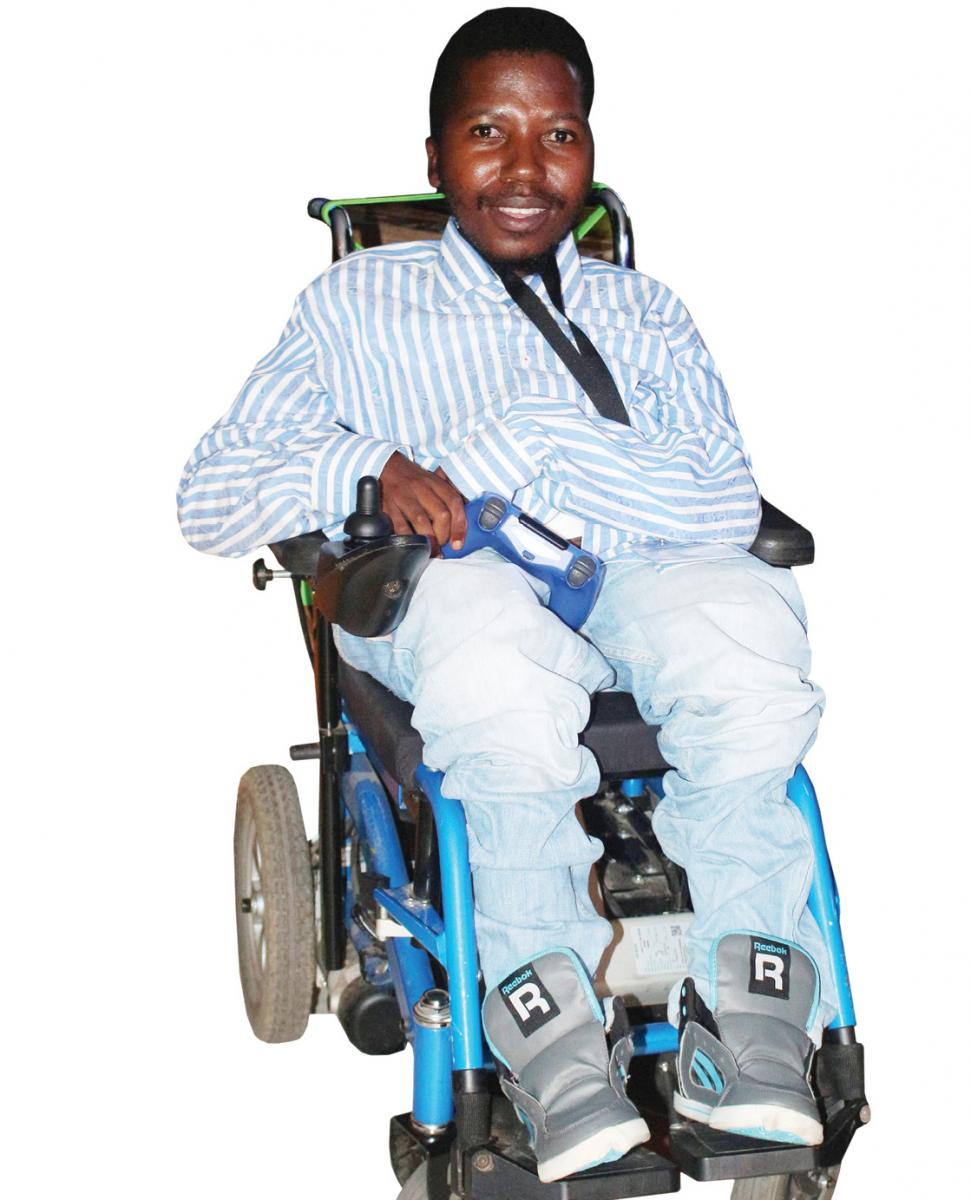
Shabalala lives with a disability called muscular dystrophy, which is a genetic disease that causes progressive weakness and loss of muscle mass.
“Living with a disability is not a joke because it comes with a lot of disadvantages and limited opportunities. I had to accept my physical and health conditions and make means with whatever pieces life throws at me,” he says.
Initially, Shabalala dreamed of finding employment in the entertainment industry but came to realise that challenges that come with his disability were limiting his dreams and a lot of money is required for him to even access basic human needs.
“I opted to become an entrepreneur so that I can make money in an environment that is suitable to meet my physical conditions because I am wheelchair-bound,” he says.
In 2014, Shabalala established a business called Entertainment Neighborhood, which is a video gaming facility that affords township gamers access to high-end video gaming facilities such as PlayStation 4, with an internet connection that allows for online gaming.
He started the business by sharing his personal gaming equipment with community members around Beaconsfield in Vereeniging, where he resides, and he charged his clients R15 per hour.
“In the beginning, most of my clients were children who could not afford to own the gaming equipment, so they would come to my home to play and I would charge each person for a 30-minute slot. The demand grew over the years and now I have managed to set up a facility outside my parents’ house, to allow my clients space to enjoy entertainment,” he says.
Shabalala employs three young people who assist him with business operations.
In order to address some of his business challenges, Shabalala successfully applied for the National Youth Development Agency (NYDA) business grant worth R49 314 which he used to buy three screens, three game consoles, additional joy sticks and five games.
“The NYDA fund has restored my hope because I received funding after my equipment was stolen, which affected my business badly. "Although COVID-19 affected our operations, my business is growing due to the assistance I received," he
says.
Managing diabetes
Managing diabetes vuyelwanDiabetes is one of the most prevalent non-communicable diseases in South Africa. According to the International Diabetes Federation (IDF) an estimated 3.85 million South Africans between the ages of 21 and 79 years have diabetes.
Diabetes is a disease caused by one’s pancreas no longer being able to produce enough insulin to process the sugar in their bodies. The disease is classified into two categories: Type 1 and Type 2 diabetes.
Type 1 diabetes is often caused by the destruction of the sugar processing cells; genetic and environmental factors. Type 2 diabetes is more common in older people, obese people, those with a family history of diabetes and people who are physically inactive. The development of diabetes can be caused by one’s diet which may include excessive eating of foods high in sugar, fats and starch as well as pregnancy. 
Symptoms of diabetes include frequent urination, excessive thirst, unexplained weight loss and extreme hunger, among others.
There is no known cure for diabetes but it can be managed by taking medication such as insulin; doing physical activities and exercise; eating food with plenty of fibre and less carbohydrates as well as eating whole grain foods.
Diabetes can be managed effectively with lifestyle changes and medication.
Healthy eating, physical activity and insulin injections are the best treatment for Type 1 diabetes. Healthy eating, physical activity and blood glucose testing are the basic treatment for Type 2 diabetes. In addition, many people with Type 2 diabetes require oral medication, insulin, or both, to control their blood glucose levels.
A person with diabetes must eat a lot of vegetables and fruit on a daily basis. Vegetables such as dark green leafy vegetables and yellow or orange fleshed vegetables are good foods for diabetic patients.
People who have diabetes are prone to having problems with their eyes, heart, kidneys and general circulation if they do not manage their diabetes well.
Diabetic people must use salt sparingly, limit the use of seasoning salts, stock cubes, soup powders and commercial salad dressings. Instead diabetic sufferers can use herbs, curry powder, ginger and garlic for flavouring.
It is also important to use small amounts of fats when cooking and be mindful to choose healthy oils such as sunflower, canola or olive oil. Too many high fat foods can result in weight gain and make diabetes more difficult to control and increase the risk of heart disease.
If you suspect that you might have diabetes, visit your nearest health facility.
This information was supplied by the National Department of Health.
Mokgadi breaking barriers in construction
Mokgadi breaking barriers in construction UrsulaThe secret of survival in entrepreneurship is the ability to adapt to demand. 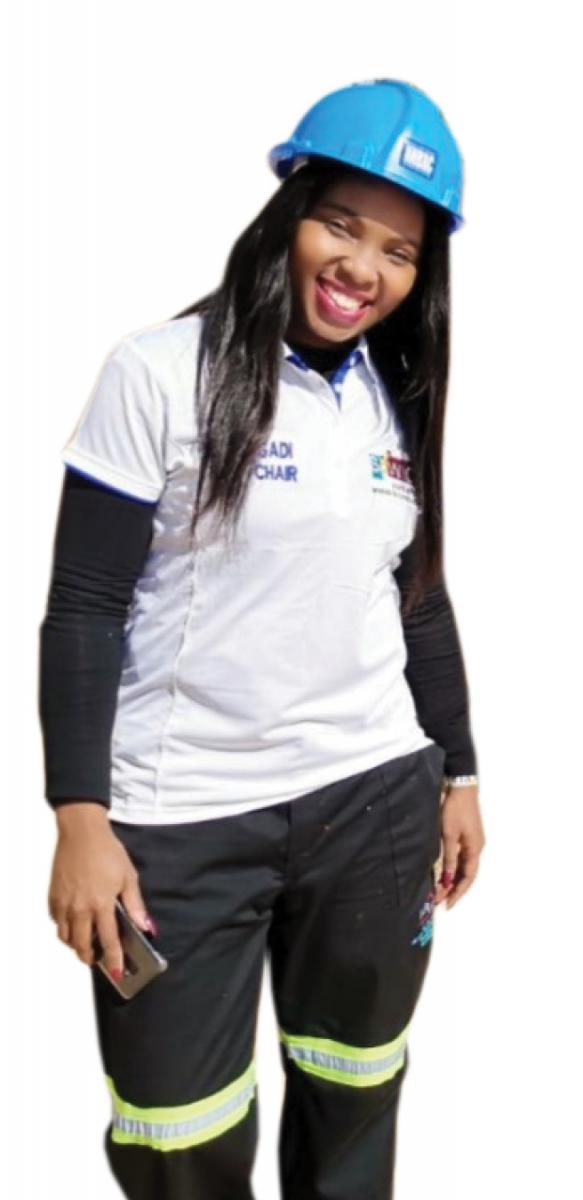
This is according to Mokgadi Letsoalo-Melwa (32) who is the founder of BUILDFIX, a construction company that focuses on property restorations, maintenance for insurance companies and banks for their property portfolios.
Her business also supplies innovative building material solutions called BUILDKIT. This business supplies electrical and plumbing material kits which are packaged according to house plan specifications for multi-units housing projects.
“We currently have presence in Gauteng and Free State provinces with plans to expand nationally,” she says.
Although most of her clients are insurance companies and banks, she also provides services to individuals and organisations.
“I ventured into the business world in 2014 to pursue my passion and desire to develop and build a successful sustainable black-owned business while building a legacy as a full-time entrepreneur,” she says.
Her company has created over 15 full-time jobs.
Letsoalo-Melwa says the Coronavirus (COVID-19) pandemic was a big blow to the construction space, and it required her company to review its business offering in order to survive the pandemic.
“It really hit us hard. We had to diversify our business model which led us to manufacturing surgical masks and surgical overalls in order to generate an income, as these were in demand during various stages of the lockdown,” she says.
An agent of change
Based in Alberton in the East Rand in Gauteng, the Limpopo-born entrepreneur holds a Post Graduate Diploma in Banking and a BCom Financial Management Degree from the University of Johannesburg.
She is also certified by the Association of Chartered Certified Accountants (ACCA) and is currently studying towards a Masters in Business Administration (MBA) at the North West University.
Letsoalo-Melwa says she sees herself as a change agent and an activist within the business of construction who breaks barriers.
“Getting into a space that does not have many young black women has been rewarding and a very challenging journey... it is not an easy path to walk, but it requires one to have a thick skin, a solid support system and to be rooted spiritually,” she says.
She encourages other black women and youth to consider starting businesses in the construction space.
Her company has received a business grant from the National Youth Development Agency (NYDA) which also linked her with the Small Enterprise Development Agency (SEDA). SEDA is currently providing non-financial support in the form of risk management training, costing and pricing.
For more information about assistance from SEDA call the toll-free number 0860 663 7867 and visit the NYDA website www.nyda.gov.za
Mpendulo ‘nuts’ about food processing
Mpendulo ‘nuts’ about food processing SiboneloMiante Manufacturing is a nut processing business, operating out of the Bakery & Food Technology Incubator (BICSA) in Pretoria.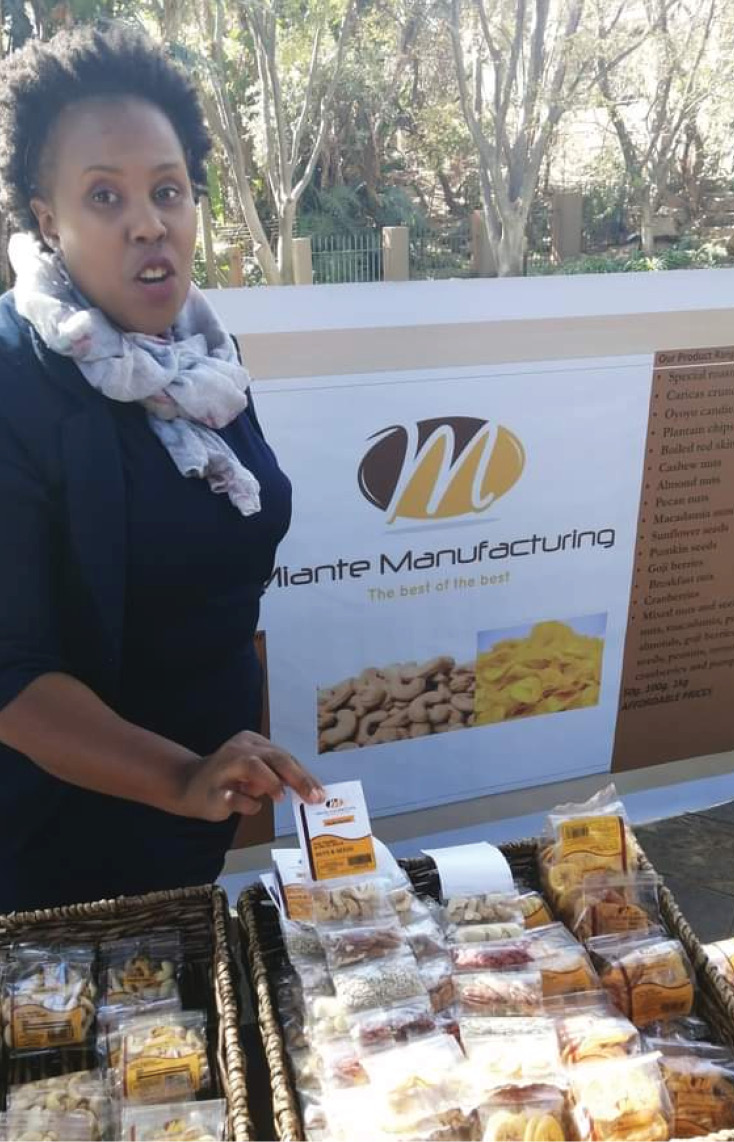
The business processes raw nuts and sells them to different markets.
Owner of Miante Manufacturing, Wendy Mpendulo, 42, says they produce different types of nut products by blending, caramelising and coating nuts with different ingredients.
“Our products and packages are made of cashew, moringa, almond, macadamia and brazil nuts. We combine the nuts with raisins, flour and different types of seeds to make mixes that can be eaten for breakfast, during trail hiking or while running and as a healthy snack,” says Mpendulo.
The nuts are packaged by Miante Manufacturing and sold to locals and shops in Gauteng and the Eastern Cape. Mpendulo says their products have been approved by the South African Bureau of Standards.
Mpendulo started the business in 2016 after receiving advice from BICSA. At the time, she owned several food caravans that were not growing. On approaching the incubator for business advice they told her to rather look at starting a legacy business that will be sustainable in the long term.
She decided to venture into the nuts manufacturing business. Mpendulo says the incubator helped with advice on obtaining the certificates she needed to operate her business. BICSA also helped her register with the Consumer Goods Council of South Africa, which means her products have been allocated a barcode.
“BICSA also helped us formulate a proper bookkeeping system. They are also currently helping us source a new machine that will be used to roast nuts. The new machine will enable us to start making peanut butter,” says Mpendulo.
BICSA has availed its services to entrepreneurs who are willing to join their programme. The incubator’s services include:
- business development
- food technology services
- skills development and training
- a rural development programme
For more information about the BICSA call 012 803 1222 or email info@bicsa.co.za
National State of Disaster extended
National State of Disaster extended UrsulaThe Cooperative Governance and Traditional Affairs (CoGTA) Minister, Dr Nkosazana Dlamini-Zuma, has gazetted the extension of the National State of Disaster by another month.
“We must also sustain our commitment to remain responsive, agile and compassionate, as we work to save lives and protect the livelihoods of all South Africans. The National State of Disaster will be in effect until 15 November 2020,” Minister Dlamini-Zuma says in a statement.
A National State of Disaster is when the government determines an emergency in a country.
In the context of the Coronavirus pandemic, South Africa is faced with a medical emergency posed by the COVID-19 virus. This means that the government must make special circumstances that warrant immediate action beyond what is provided for in existing legislation.
This is to prevent and contain the threat of the virus to the country's healthcare system, economy and the people.
The country has been in a National State of Disaster since March, due to the advent of the COVID-19 pandemic.
The extension follows consultations and approval by Cabinet, CoGTA said in a statement.
“The decision to extend the State of National Disaster was not taken lightly. Consideration of the material conditions within the context of the Risk-Adjusted Strategy motivated the decision to endorse this further extension.
"It is important to note that the current measures contained in the regulations to deal with the disaster, in the context of the Risk-Adjusted Strategy, are needed beyond 15 October 2020,” the department said.
The Minister has expressed gratitude for the public support for measures to mitigate the spread of the pandemic, including maintaining social distancing, regular washing of hands or sanitising, and the wearing of masks in public.
-SAnews.gov.za
New clinic for low vision patients
New clinic for low vision patients vuyelwanPeople with vision impairment will soon get treatment that can restore their sight − thanks to the new Jannie Mouton Low Vision Clinic.
The clinic is situated within the Cape Town Society for the Blind’s (CTSB) Salt River Campus in the Western Cape. The clinic assists five million South Africans that suffer from low vision.
Low vision is a condition caused by eye disease where one’s ability to identify shapes and words is poor. Low vision cannot be corrected or improved with regular spectacles. 
CTSB’s chief executive officer Lizelle de Wet says low vision can be in the form of partial sight, blurred vision, blind spots, night halos, partial blindness and tunnel vision. “Being classified as low vision ranges from light to severe impairment. Each case is different and requires subjective treatment and care.”
The clinic is equipped with an auto refractor machine, which is used to measure the efficiency of a person’s eyesight when prescribing spectacles.
According to de Wet, visual impairment disrupts the livelihood of people who are partially blind. She says an estimated 97 percent of all blind and partially sighted people in South Africa are unemployed. She added that over 90 percent of people that go blind in their youth don’t work for more than six months in their entire lives.
“I believe that utilising this clinic could ultimately significantly improve the employability of thousands of South Africans suffering from low vision,” De Wet says.
The CTSB says one of the main advantages of the low vision clinic is that after assessing the eye condition of the patient, the clinic has the ability to also provide assistive devices.
The clinic has received numerous funders which include the National Development Agency which contributed over R500 000. The NDA’s funding has been used for training staff; buying furniture and assistive, sensory and visual devices, including playing and learning equipment.
The Jannie Mouton Low Vision Clinic can be reached by calling the CTSB on 021 448 4302 or by sending an email to info@ctsb.org.za.
Ntsime hops to success through rabbit farming
Ntsime hops to success through rabbit farming SiboneloRabbit farmer and owner of High Five Productions Orateng Ntsime, 30, has gone from farming four rabbits in 2016 to being a sustainable farmer, breeding 50 rabbits in four months.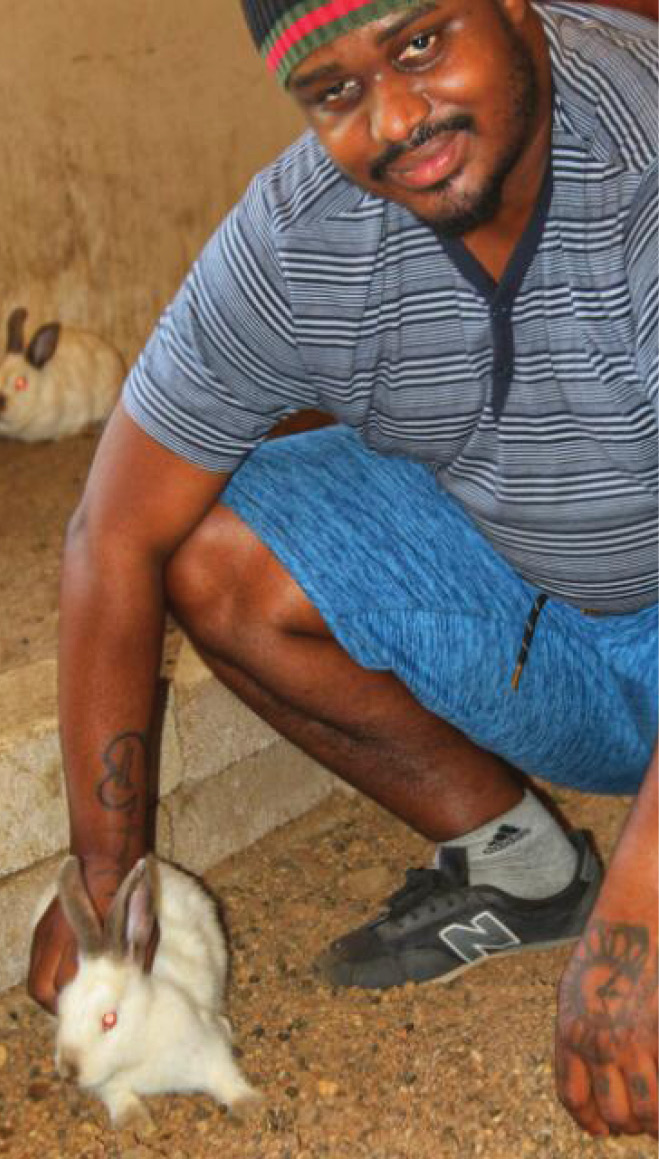
Ntsime from Moruleng village in Rustenburg, North West, sells California rabbits that are consumed as meat. He also sells Netherlands Dwarf rabbits that can be kept as pets.
“The rabbit meat cost R140 per kilogram while the Netherlands Dwarf rabbits cost R600 per rabbit,” Ntsime says.
He grows the rabbits by feeding them fruits, vegetables and specialised rabbit feed. “It takes about four months for a rabbit to grow from being a kitten to a size where it is ready to be consumed or kept as a pet,” says Ntsime.
He adds that his clients include butchery owners and followers that he has gained from marketing his business on Twitter and Facebook.
“One of the earliest challenges I faced in the business when I started was attracting customers outside my village. I started reading up on how to use social media to promote my business online. The business has taken off from that point. Currently I deliver to clients in Johannesburg every month,” he says.
Ntsime says his rabbit meat is popular among those hosting braais and customers who are going on safari.
As a small-scale farmer who produces less than 10 000 rabbits, Ntsime is not required to get approval for the farming of the rabbits.
Ntsime advised small-scale farmers looking to enter the sector to do research about the type of farming that they would like to venture into.
“To succeed as a rabbit farmer, you must first know the rabbits that you are farming more than the business. Rabbits, like any other animals, get sick and need special attention.
“You have to observe, learn and understand behaviour because when something is wrong that is how you will see it in the early stages,” says Ntsime.
Report bad cops to new hotline
Report bad cops to new hotline UrsulaThe Independent Police Investigative Directorate (IPID) has launched a toll-free number that will allow the public to lodge complaints about police officers. 
The IPID is mandated to conduct independent and impartial investigations of criminal offences allegedly committed by police officers and municipal police.
Speaking at the launch recently, Police Minister Bheki Cele said while he was confident that the majority of police officers were hardworking, dedicated and honest, there were rogue elements that disgrace the badge.
“Police misconduct, whether alleged or proven, has a negative impact on our society. Any transgression committed by an officer of the law erodes the trust and confidence communities have towards the police,” Minister Cele says.
He acknowledged that many of these “police turned criminals” have been brought before the courts.
Minister Cele saluted the IPID for continuing to take down criminals masked as police. This includes the arrest of officers implicated in alleged corruption, and those violating their constitutional mandate.
“In many cases, the police directorate will also step in when the conduct of the police, during operations, is in question. Whatever the case, IPID is required to exercise its powers fairly, impartially and without fear, favour or bias,” said Cele.
With the launch of the hotline number, communities will have better access to justice and recourse.
“I urge all South Africans to use this number wisely and responsibly. Report officers who sleep on duty. Report officers who turn away victims of gender-based violence and domestic violence at police stations.
“Report officers who abuse State resources and State vehicles. Report officers who harass and intimidate citizens. Report officers who aid in the sale of drugs and protect drug dealers. Report all forms of corruption by officers,” said the Minister. ----SAnews.gov.za
The public can lodge complaints on the new IPID toll-free hotline on 0800 111 969.
SA rolls up sleeves to recover from COVID-19
SA rolls up sleeves to recover from COVID-19 vuyelwanAfrica recover from the devastating economic impact of the COVID-19 pandemic.
The announcement was made at a Joint Hybrid Sitting of Parliament.
The President says it is important to get people back into the jobs they lost during the Coronavirus (COVID-19) pandemic.
“We are determined to create more employment opportunities for those who were unemployed before the pandemic or who had given up looking for work,” the President says. 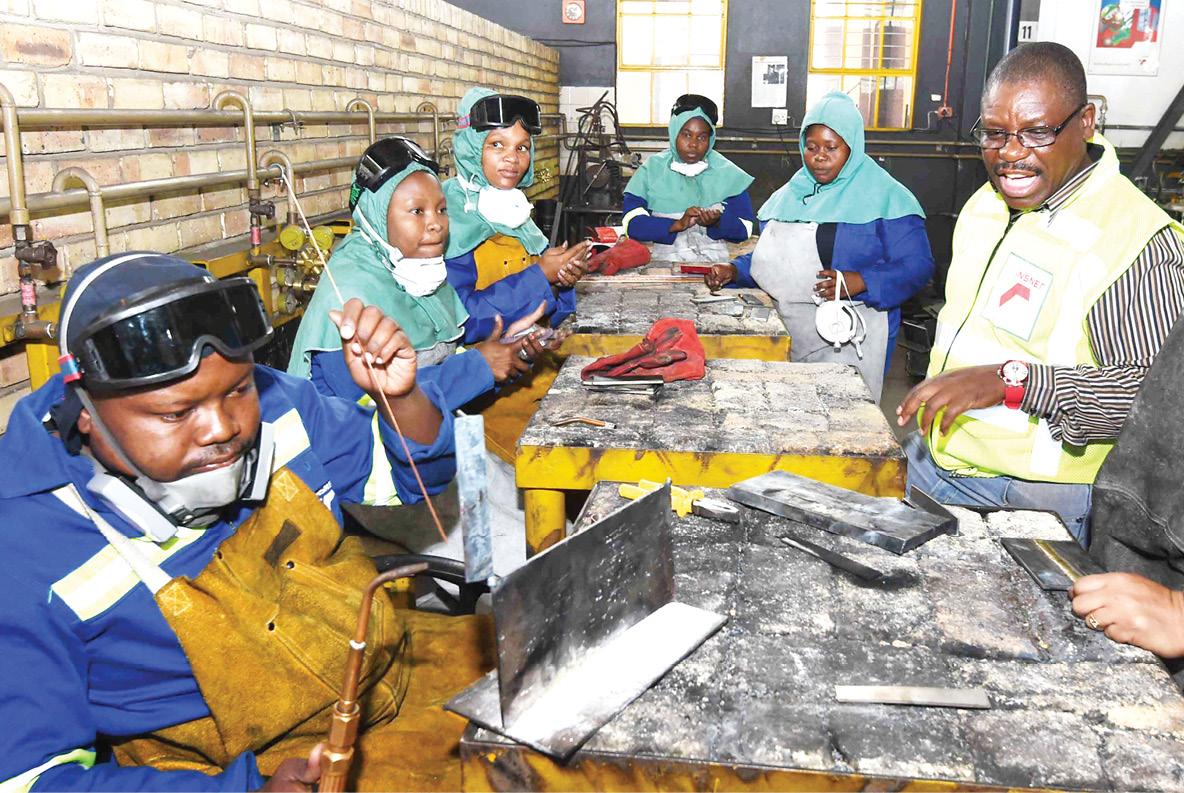
“This means unleashing the potential of our economy by, among others, implementing necessary reforms, removing regulatory barriers that increase costs and create inefficiencies in the economy, securing our energy supply, and freeing up digital infrastructure,” he added.
This plan directly responds to the immediate economic impact of COVID-19 by driving job creation and expanding support for vulnerable households.
“We aim to do this primarily through a major infrastructure programme and a large-scale employment stimulus, coupled with an intensive localisation drive and industrial expansion,” says President Ramaphosa.
According to the President, the interventions outlined in this plan will:
- Achieve sufficient, secure and reliable energy supply within two years;
- Create and support over 800 000 work opportunities in the immediate term to respond to job losses;
- Unlock more than R1 trillion in infrastructure investment over the next four years;
- Reduce data costs for every South African and expand broadband access to low-income households;
- Reverse the decline of the local manufacturing sector and promote reindustrialisation through deeper levels of localisation and exports;
- Resuscitate vulnerable sectors such as tourism, which have been hard hit by the pandemic.
According to the modelling done by National Treasury, the implementation of this plan will raise growth to around three percent on average over the next 10 years.
Unleashing the economy
The President say the recovery will be pushed by swift reforms to unleash the potential of the economy and will be supported by an efficient state that is committed to clean governance.
“It will be transformative and inclusive. It will be digital, green and sustainable, and it will invest in our human capital to lay the foundations for the future.”
Furthermore, he says the economic Reconstruction and Recovery plan recognises that to support a rapid economic rebound, South Africa needs to focus on a few high-impact interventions and ensure they are executed swiftly and effectively.
“This is a plan through which all of us as South Africans should work together to build a new economy.”
The objectives of the plan are:
- To create jobs, primarily through aggressive infrastructure investment and mass employment programmes;
- To reindustrialise our economy, focusing on growing small businesses;
- To accelerate economic reforms to unlock investment and growth;
- To fight crime and corruption; and
- To improve the capability of the state.
President Ramaphosa says the pandemic continues to cause severe damage to the global economy, affecting trade, investment, production, international travel and global supply and demand.
COVID-19 economic impact
In South Africa, the pandemic has caused great hardship and suffering. More than 18 000 people are confirmed to have died from COVID-19.
South Africa has over 700 000 confirmed cases. At present, 90 percent of those infected have recovered.
While the national lockdown in April had a significant impact on economic activity, President Ramaphosa says the economic consequences of an uncontrolled surge would have been far worse.
“Due to the dedication and sacrifices of millions of South Africans, we were able to limit the impact of the pandemic on lives and livelihoods,” he says.
As South Africa significantly eased restrictions on movement and social and economic activity, the average number of daily cases has remained relatively stable at less than 2 000 cases.
But President Ramaphosa says it is far too soon to declare victory as the World Health Organisation (WHO) warns that many countries have had a significant resurgence of infections following four to eight weeks of low transmission.
“It has also advised us that South Africa is now entering a phase that requires high vigilance and heightened readiness to respond.”
“Rather than easing our prevention efforts – including social distancing and observing health protocols – we must intensify them further to reduce new cases to less than 1 000 a day,” he adds.
The President says COVID-19 will remain part of our lives for some time to come, and everyone needs to adjust to this new reality and a new normal in all areas of life.
Taking action against crime, corruption
Taking action against crime, corruption vuyelwanGovernment has reiterated its commitment to take decisive action against crime and corruption – a move President Cyril Ramaphosa says is essential for inclusive growth.
“We are working to clamp down on the illegal economy and illicit financial flows, including transfer pricing abuse, profit shifting, VAT and customs duty fraud, under-invoicing of manufactured imports, corruption and other illegal schemes,” the President says.
He was addressing a Joint Hybrid Sitting of Parliament on the South African Economic Reconstruction and Recovery Plan. 
“A well-functioning Revenue Service is central to our economic recovery programme. The turnaround at the South African Revenue Service (SARS) has begun in earnest, and significant areas of tax evasion and tax fraud have already been identified,” the President says.
SARS is rebuilding its capacity to reverse the decline, improve compliance and recover lost tax revenue.
“The decisive action we have taken to prevent, detect and act against COVID-related corruption will strengthen the broader fight against crime,” the President says.
The Special Investigating Unit (SIU) has made significant progress in probing allegations of criminal conduct in all public entities during the National State of Disaster.
“The work of the SIU continues and the outcomes of the investigations will be made public once all the due processes have been completed.
“Law enforcement agencies are being strengthened and provided with adequate resources to enable the identification and swift prosecution of corruption and fraud,” President Ramaphosa says.
No political interference in corruption investigations
The President has assured all South Africans that there will be no political interference in the work of law enforcement agencies.
“We will strengthen the framework to ensure that political office-bearers, at all spheres of government, do not do business with the State.
“We welcome the agreement at the National Economic Development and Labour Council (Nedlac) that all social partners will act decisively against corruption and fraud in their ranks.
Government will soon finalise and begin the implementation of the new National Anti-Corruption Strategy, which will improve transparency, monitoring and accountability in government and across society.
“Through these actions, we will ensure that every Rand of public expenditure is spent productively to benefit our people and support our recovery effort,” President Ramaphosa says.
Theatre finds new home online
Theatre finds new home online SiboneloRelying on technology throughout the lockdown period has proved to be effective for the South African State Theatre, which could not deliver live theatre to audiences in the past six months. 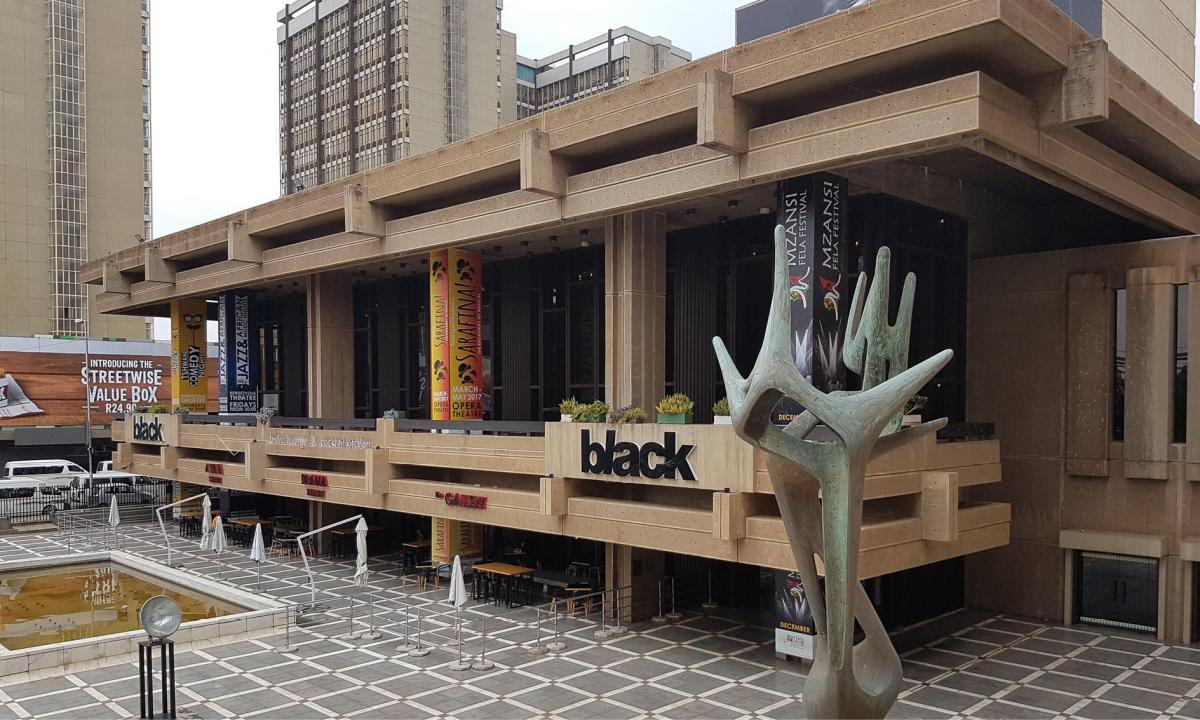
The State Theatre Artistic Director Aubrey Sekhabi says although the Coronavirus (COVID-19) pandemic and the national lockdown regulations were
devastating to artists, digital platforms afforded artists an opportunity to adapt to the new normal.
He says both artists and the administration of the theatre were able to function during the lockdown period through technology and digital platforms.
“With all the restrictions introduced to observe the lockdown, our bread and butter, which is live performance in front of an audience, was compromised. We could not collect revenue from ticket sales, front of house sales, hiring and wardrobe and our parking facility,” says Sekhabi.
“The situation was more devastating for artists because they could not practice their craft, their livelihood,” he adds.
Embracing digital arts
Sekhabi says that the theatre was able to continue its work through digital platforms.
“We decided to embrace the new normal and retain our online streaming as a secondary platform for our offering. We hope this strategic move will help us cope with the new normal and at the same time increase our reach and create solid building blocks for young and upcoming artists,” says Sekhabi.
Unlike other institutions in the arts sector, the State Theatre has been recording and archiving its productions over the past six years.
He says this made it easy for the theatre to kick off its artistic programme during various stages of the lockdown, and has afforded productions and freelance artists a second season on online platforms.
“We have also managed to put our new content on our Pay per View platforms, generating income and ploughing it back into new projects, he says.
Through the Pay per View platform, audiences are able to view content online after buying tickets on Webtickets through a link sent to them via email or a short message.
State theatre ready for business
Speaking about the future of the State Theatre, Sekhabi says the theatre is back on track and has opened its doors. It has recently hosted South African Idols which performs for live audiences.
He says most live shows started at the end of October and details of other shows will be communicated once they are finalised.
“The recent productions shown to our audiences will swiftly usher us into the 2021-2022 season which is exciting and presents a diverse offering of music, theatre, dance and lots of conversations,” says Sekhabi.
A culmination of festivals
With the increase of gender based violence, Sekhabi says the theatre will present the Vavasati International Festival, where women’s voices are heard.
“The festival will culminate in a series of performances during the 16 Days of Activism for No Violence Against Women and Children campaign. The year will be incomplete without the Mzansi Fela Festival, where the best of South Africa's talent and the best of the year woo audiences in big numbers to the festivities.
“Mzansi Fela Festival brings with it the Field Work Programme which recognises amateur and semi-professional talent by providing a platform to present classical south African plays and the creation of new work,” he says.
Moving forward, Sekhabi says the State Theatre has taken a strategic decision to use online platforms as secondary platforms for theatrical content distribution.
He says it will continue to observe all safety protocols in the new normal.
Sekhabi says one of the benefits of entering the Fourth Industrial Revolution (4IR) is that content can be accessed by a larger audience world-wide.